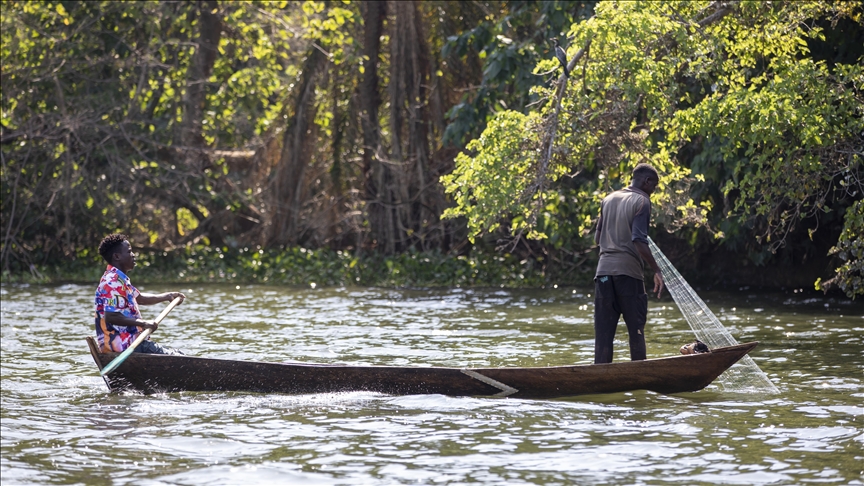Lake Victoria – a lifeline for East Africa, sustaining the economies and diets of millions across Tanzania, Kenya and Uganda – is facing an existential crisis

- Dumping of waste, plastic pollution, and the pressures of urban growth are taking a toll in areas such as Mwanza in Tanzania
- ‘This lake is our past, our present, and our future. If we don’t save it … we’re losing everything,’ says fisherman Elias Kabashi
MWANZA, Tanzania
At first light in Mabatini, a crowded slum clinging precariously on the rugged hills of Tanzania’s port city of Mwanza, life stirs into action.
Children’s laughter echoes down narrow dirt paths, fishmongers shout their prices, and the sharp clatter of cooking pots signals the start of the day.
From a craggy outcrop overlooking this chaotic sprawl, Elias Kabashi, a fisherman and father of four, gazes out at Lake Victoria.
The lake sparkles faintly in the distance, reflecting the rising sun. To a casual observer, it looks serene, almost eternal. But for Kabashi, who has fished its waters for over a decade, that shimmer feels like a cruel illusion. He has watched the lake’s glory fade, year by year, due to piles of untreated waste, plastic pollution, and the pressures of a growing city.
“This lake used to be alive,” says Kabashi. “You could pull in your net and it would be full. Now, the fish are fewer, smaller and sick. What are we doing to our home?”
Lake Victoria is the lifeblood of East Africa, sustaining the economies and diets of millions across Tanzania, Kenya and Uganda. But in places like Mabatini, where life wobbles between resilience and desperation, the lake faces an existential crisis.
Mwanza, Tanzania’s second-largest city, has always been a hub of growth and migration. Perched on the southern shores of Lake Victoria, its population swells as people flock from rural areas seeking opportunity.
This growth comes with a cost: over 350 tons of solid waste are generated daily, much of it left uncollected, unprocessed, and unregulated. The city council claims a 75% collection rate across its wards, yet in places like Mabatini, no waste services exist at all. Instead, garbage accumulates at informal dumpsites, spilling into waterways and clogging the ecosystem that sustains life here.
– ‘We’re killing ourselves slowly’
Mabatini is a maze of crumbling shacks and unpaved paths. Two rivers, Kenge and Mirongo, snake through the settlement, carrying a toxic cocktail of untreated sewage, industrial runoff, and plastic waste straight into Lake Victoria. Children splash in the murky water, oblivious to the invisible threats. Women scrub clothes on the riverbanks while greasy oils from nearby car wash stations swirl downstream.
“When the rains come, the pit latrines overflow,” Kabashi says. “All that filth – everything – ends up in the rivers and then in the lake.”
A 2023 study conducted by the University of Dar es Salaam revealed alarming concentrations of microplastics in the lake’s waters. Nearly 20% of sampled Nile perch and tilapia – staples for local communities – were found to contain fragments of plastic.
Kabashi calls it a vicious cycle: “We’re poisoning the fish, then we eat them. It’s like we’re killing ourselves slowly.”
The pollutants do not just threaten human health. Nitrogen and phosphorus from untreated waste feed massive algae blooms, depleting oxygen and suffocating aquatic life, researchers say.
For fishermen like Kabashi, the economic impact is devastating.
“We must do something to rescue this lake,” he says. “Our future generations will find no fish to hook up and sell.”
– Fragile foundations
Mwanza’s steep topography complicates even basic waste management. Most residents rely on pit latrines or open dumping. During the rainy season, waste overflows, turning pathways into streams of sludge. The city’s patchwork of community-based waste collectors and private firms struggles to keep pace.
Without formal systems to sort organic and plastic waste, much of it ends up clogging rivers or accumulating on the lakebed.
This fragile infrastructure reflects a deeper neglect, says community leader Esther Masanja.
“When officials came to build toilets here in Mabatini, I thought, finally, things might change,” Masanja recalls.
She donated stones from her land to help construct urine-diverting dehydrating toilets, a project spearheaded by the Mwanza Urban Water and Sewerage Authority. These toilets separate human waste for agricultural use, offering a glimpse of sustainable sanitation.
But Masanja says adoption has been slow.
“People don’t trust new things, especially when they’re already struggling to survive. And let’s be honest, we need more than toilets. We need clean water, education and real government support.”
– A regional crisis
Lake Victoria’s plight is not Mwanza’s burden alone. The lake stretches across three nations, its health tied to regional cooperation. Programs like the Lakewide Inclusive Sanitation (LWIS) initiative, led by the Lake Victoria Basin Commission (LVBC) of the regional bloc East Africa Community, aim to improve waste management and restore fragile ecosystems.
Speaking with Anadolu, LVBC Executive Secretary Masinde Bwire says the health of Lake Victoria is critical for the environment and the livelihoods of millions of people.
“We are implementing robust policies to tackle pollution head-on, including controlling industrial waste discharge and promoting eco-friendly practices among communities,” he says.
“One of our key priorities is reducing plastic waste, which has become a significant threat to aquatic life. We are working with local governments to establish recycling programs and raise awareness about the importance of proper waste management.”
According to Bwire, joint efforts are aimed at ensuring that all stakeholders, including fishermen and large corporations, adhere to stricter environmental regulations. “We are also investing in modern water treatment technologies to minimize the impact of urban and agricultural runoff into the lake,” he says.
“By uniting communities, governments and private entities in this fight, we are confident we can restore the lake’s health and secure its benefits for generations to come.”
Yet for many like Kabashi, these efforts feel distant.
“We hear about these big projects, but what actually changes?” he says. “Every year, the lake gets worse.”
Even small-scale recycling efforts by waste pickers, who salvage plastics and metals for resale, barely make a dent in the crisis.
Their work highlights a cruel irony: the poorest residents, who contribute the least to the lake’s degradation, are often the ones trying to save it.
Despite the dire circumstances, there are signs of hope. New community-driven sanitation initiatives, growing awareness of recycling, and coordinated regional projects hint at a path forward. Scientists and environmentalists argue that reversing the lake’s decline is still possible, but only with urgent and unified action.
For Kabashi, the stakes could not be higher: “This lake is our past, our present, and our future. If we don’t save it, we’re not just losing the lake. We’re losing everything.”
Anadolu Agency



